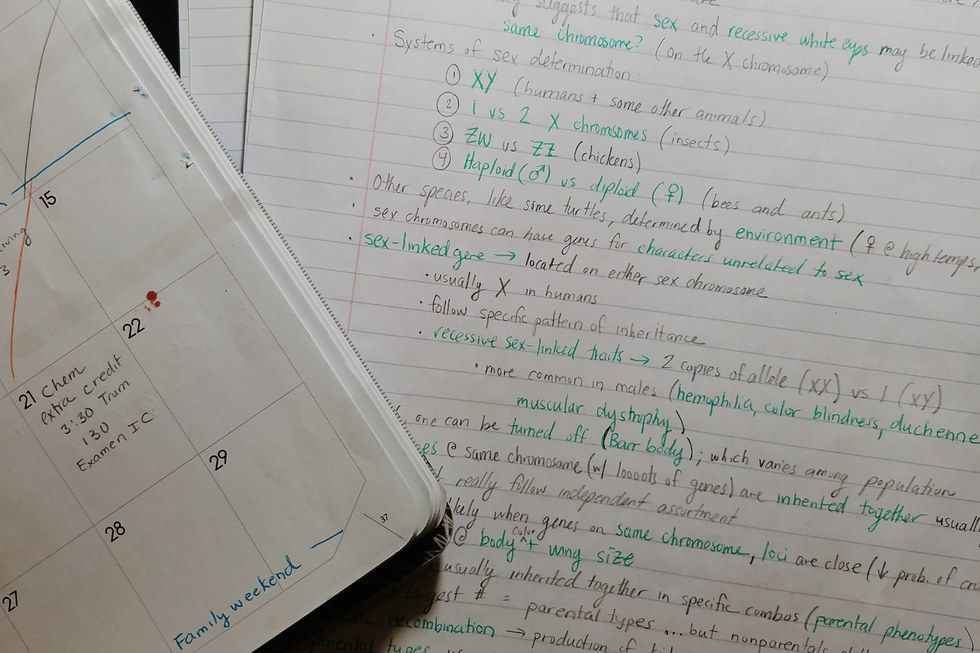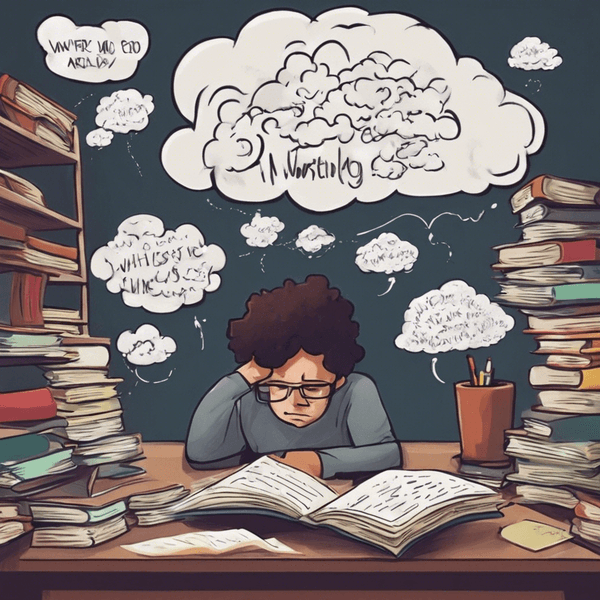Let's get into it.
1. Plan Your Study Sessions
Set aside a specific place and time period in the day strictly dedicated to studying. Do not do your work in a place that's too comfortable, such as a bed or a sofa. There are several reasons for this; for one, it is absolutely awful for your posture in the long run, and you run the risk of falling asleep. On the other hand, if the place is too uncomfortable, your focus will turn to how uncomfortable you feel instead of what you need to finish.
Additionally, make note of what you want to accomplish and set a deadline for yourself—whether it be at 6:00 pm tonight or this Friday, write the assignments and goals in a planner, which makes it easier to remember everything you need to accomplish. Cross off the goals as you complete them; making the last cross is undoubtedly one of the most satisfying feelings ever! Staying organized is half the battle.
2. Take Notes in a Way That Works for You
Personally, I prefer handwriting my notes on loose-leaf paper (to allow ease for shuffling papers around) and color-coding my notes with colorful pens; the image above is a picture of my actual notes from the most recent Biology exam. Others will say they prefer typing the notes, creating their own outlines via PowerPoint or otherwise, recording the professor's lectures if able, or simply re-reading the content over and over. Figure out the best way to take notes for you; some common methods that have worked for others include writing lecture notes in their own style of short-hand (in other words, do not try to write down what the professor says word for word, just the key points and examples), making note of an unclear concept for review after class, re-writing notes when studying, and making flash-cards, physically or online on websites such as Quizlet.
Although I stress that one should find their preferred method of note-taking, several scientific studies such as this one show that handwriting the notes "better facilitates comprehension (Sierra Nevada College)." But, again, if taking notes digitally works for you, then by all means continue to do so.
3. Practice Tests and Quizzing Yourself
This is an essential strategy if you are preparing for a standardized test like the SATs, MCAT, AP exams, and the LSATs, although quizzing yourself for your everyday tests can be a game-changer, as well. Practice tests let you know what topics you need to look at more closely and what your strengths are, and they also familiarize you with the layout and perhaps the time limits of the exam. Because you become more familiar with the test, you reduce your anxiety about it; perhaps you might even see extremely similar questions on the real exam which you now know how to answer because you went through a practice exam! Test-taking is crucial because it reinforces the information; although it can be grueling, it undoubtedly pays off in the long run. My personal testimony is that I improved my SAT score by 500 points simply by taking practice exams (back when the 2400 scale was still in use).
4. Consider Group Work
Studying in groups can help you stay on task, contrary to popular belief! Not only can you quiz each other on the material, but you can also keep each other on task. Another great way to master the material is to be able to explain it to another person in a way that they will understand; this is to assure you that you understand the information front and back. If you and your friends set a particular time to meet, then you are less likely to put off studying by yourself until the wee hours of the morning. Additionally, you may find new perspectives on the content from other students.
5. Stay Hydrated & Snack on Brain Food
On average, a person should drink 64 ounces per day (more if you are an athlete), which is equal to approximately two liters or half a gallon. About 75% of the brain is composed of water; therefore staying hydrated is essential for brain function! Dehydration has been scientifically proven to affect brain structure and function; headaches are common of dehydrated individuals (for those of us of legal drinking age, alcohol dehydrates the body-- this is why people experience hangovers the morning after). I know for a fact that the last thing I want to be doing with a headache is to study, so taking precautions go a long way.
Also, don't study on an empty stomach! Your attention will turn to your growling stomach instead of studying, so be sure to snack on healthy, light, non-processed foods like fruits, nuts, and granola to keep yourself alert and on that study grind.
6. Minimize Distractions
Make sure your environment is free of distractions; this includes your cell phone, Netflix, pets, pestering siblings, your beloved PlayStation-- anything that could break the inertia once you have buckled down to study. If you are working on the computer, there are apps that can be used to block unproductive websites-- SelfControl (Mac) and StayFocused (Google Chrome extension) are two of the many apps such as these; you decide how long the app restricts you from unproductive tasks such as checking Facebook or lurking through Reddit.
On the mobile interface, apps like Forest help students stay on track by growing a virtual tree; the longer you work (and stay off of your phone), the more lush the forests become; the moment you leave the app, the forest dies. Alternatively, Offtime works in a similar way as SelfControl and StayFocused regarding the blocked apps. For the extremists, Flipd locks the phone for a predetermined amount of time-- even restarting the phone will not disable the app.
7. Instrumental Music
Note that this list includes instrumental music (no vocals!). Instrumental music, such as classical music and movie and video game sountracks, can relax you and improve concentration. For example, think about the movies you have seen-- the background music is never distracting from the subject, but in fact brings your attention on what is happening on-screen. Music has a calming effect which may alleviate some of those nerves about that midterm; additionally, some scientists have speculated a "Mozart Effect" which claims listening to classical music improves cognitive function, although this is still debatable.
Spotify is by far my favorite app; it has an extensive library of music in which you can create seemingly endless playlists of your favorite music. One of my playlists, dedicated solely to being productive, consists of instrumental music ranging from the Game of Thrones soundtrack, to that of Pokémon: Re-orchestrated (music from the Pokémon video games in the style of classical music) by Braxton Burks, to modern instrumental covers of popular music by the Vitamin String Quartet.
8. Take Advantage of Resources
Do not shy away from asking for help! Perhaps you are saying to yourself, "No way, I would feel like an idiot for needing help," but your teachers and professors are teachers and professors for the purpose of aiding your success. In my experience, most teachers are more than happy to re-explain a concept to you or explain it in an alternative way. If you still feel anxious about asking for help, there are endless resources available, including websites like Khan Academy which use videos and quizzes to convey the information; someone on YouTubehas most likely posted a tutorial explaining every detail about the information. Furthermore, review books such as the ones from your high school AP courses are a God-send, which succinctly and cleanly review the topics, often accompanied with practice problems and answer keys.
9. Skip the All-Nighter
First of all, you should be ashamed that you have put off all of the work until the night before.
Second of all, many people underestimate the importance of sleep, seeing it as something to put off if need be-- "Oh, I can function just fine on four hours of sleep." You know who you are; I used to be the same way, until I took a class about sleep in the first semester of college. Memory consolidation and sleep go hand-in-hand; the brain consolidates and stores memories from the day during the REM stage of sleep, which occurs at the end of each sleep cycle. Optimally, one should go through six sleep cycles (each cycle lasts about 80 minutes, so about 8 hours of sleep) to get the best results. Additionally, studies have shown that sleep deprivation affects performance noticeably, with long-term sleep deprivation having the potential to negatively affect your health and overall cognitive skills. Furthermore, if all-nighters were advantageous, they would only help short-term memory slightly; if you really want to master the material, it is best to review small chunks of the material over long periods of time (every few days; yes, this means you would need to study the material much earlier than the day before an exam).
Personally, I found studying a few minutes before bed, getting my recommended hours of sleep, then reviewing the content in the morning yields the best results. On a slightly related note, Sleepyti.me is an incredible and simple app that essentially shows the best time to go to bed if you need to wake up by a certain time or the best time down to the minute to wake up if you went to bed right now by calculating your sleep cycles.
10. Take a Break
This may be the most important piece of advice: reward yourself for all the hard work that you are doing! A particular studying and time management method called thePomodoro Technique incorporates breaks as a "reward." The simple idea is to work for 25 minutes without distraction, take a short 5 minute break in between each 25-minute work session, then take a longer break (15-30 minutes) after every four work sessions (25-5-25-5-25-5-25-30, repeat as needed). Of course, the time intervals can be altered, but keep a similar format. Using this technique, your brain can take the rest it deserves, you can give yourself 5 minutes to update your Instagram or revive your Snapstreak, and you could even squeeze in an episode of The Office or half of Marvel's Luke Cage or Supernaturalduring your long break. Also, studying fatigue is a real thing; your brain will not retain information as well if mentally exhausted! And most importantly, don't forget to reward yourself after finishing that seemingly 300-page essay or taking that exhausting exam-- you deserve it!
Happy studying!
















 StableDiffusion
StableDiffusion Photo by
Photo by  Photo by
Photo by 
 full parking
StableDiffusion
full parking
StableDiffusion









